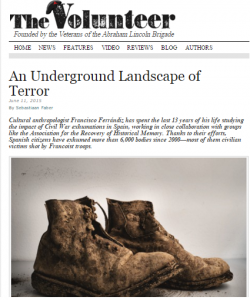Letter to the Editor: Ferrándiz and Cercas
It is always tempting to imagine writers looking over our shoulders when we critique their works, smiling or grimacing as the case may be. The compelling interview that Sebastiaan Faber conducted with Francisco Fernández and their incisive analysis of the “exhumation efforts” in Spain (“An Underground Landscape of Terror,” June 2015) made me wonder what Javier Cercas would say about the references to him in this interview. Faber’s comment that “the novelist Javier Cercas claimed that historical memory became an industry of its own,” led, in turn, to Fernández’s assertion that Cercas “is full of it” because “ironically, Cercas himself has sold millions of books about the Civil War, in dozens of languages.” Would Cercas smile or grimace or perhaps offer a Cervantine nod of irony and add a footnote of his own which would read: “See chapter 8, part III of my novel, El impostor1, where I accuse myself of exactly the same words you write in The Volunteer!” Lest the Volunteer’s readers conclude that Faber and Fernández characterized Cercas as accurately as they described the complex political issues entwined with the exhumation of graves, I must note that Cercas carefully warns his readers that Chapter 8 of Part III is the only chapter of the novel infused with his own doses of fantasy rather than with those of his subject, Enric Marco, the impostor who claimed he was a survivor of the Nazi concentration camps.
How do we then read this critique of an author in the pages of The Volunteer when the author himself has anticipated such a critique and presented an ironic version of himself as a writer who has profited from the very industry of historical memory that he himself has criticized? Can we conclude that Cercas would agree with Fernández’s characterization of him? Or is Cercas merely playing a Cervantine game with his readers, and specifically those of El impostor? A game in which he first deauthorizes himself in the form of a skillfully developed mea culpa and then refutes this very mea culpa by situating it in a chapter labeled as purely fictitious and fantastic. The broader question, of course, is: How do we view the politics of historical memory in Spain? Here I would argue that Fernández and Cercas are, in fact, aligned in their critique of the Spanish government’s “irresponsible and opaque” policy for allocating subsidies for the exhumations, as Fernández notes. I applaud Fernández’s desire to pinpoint the source of the problem–the Spanish government—as well as Cercas’s desire to use fiction to create zones of ambiguity that cast doubt on our attempts to arrive at definitive interpretations.
1 El impostor, (Barcelona: Random House, 2014).
Linda Gould Levine
Professor of Spanish
Montclair State University
Montclair, NJ 07043













